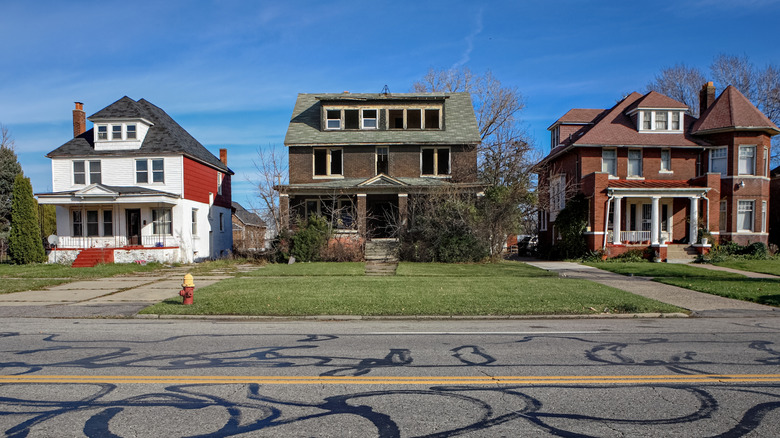Real Estate Investors Are Flocking To A Midwest City With High Crime And Decades Of Population Decline
Detroit, Michigan, experienced a colossal population decline between 2000 and 2020, losing as much as 33% of its population, according to the New York Times. Per The Associated Press, in 2013, the economic outlook for the city got so bad that Detroit claimed bankruptcy protection as it began to buckle under $18 billion in crushing debt. A declining auto industry and the aforementioned loss of population led to abandoned and derelict housing, high unemployment, and rampant crime.
Socioeconomic failures helped make this Michigan city a place even retirees avoid. But the city was able to restructure its debt in 2014, thanks to the financial cushion provided by $800 million in funding from various foundations and the state. And now, the tide seems to be changing, as Detroit is experiencing somewhat of a rebirth. According to data from the U.S. Census Bureau (via the City of Detroit), the city's population grew from 631,366 residents in 2022 to 638,914 in 2023; meanwhile, in 2024, the city added another 6,791 residents. In total, Detroit grew its population by 12,487 in the three years between 2021 and 2024, representing the largest population jump in Detroit's history since 1957. Between its affordable housing and this sustained (albeit modest) population growth, the city has become attractive to real estate investors searching for bargain deals.
Here's why investing in real estate makes sense in Detroit
According to Zillow, the median sale price of a home in Detroit in November 2025 was less than $80,000. Meanwhile, the Federal Reserve Bank of St. Louis pegged the 2025 median sales price of homes in the U.S. at $410,800. Obviously, population gains in a city where home prices are less than one fifth of the national median are a major reason real estate investors take a chance on the Motor City. Thanks to an influx of new industries outside of the auto sector, like finance, tech, healthcare, and the arts, and public infrastructure being on the receiving end of public-private investment, investors have a diverse, steady pool of buyers and renters to draw from.
The city's housing stock is getting upgraded, too. To tackle urban blight and provide appealing housing for residents, organizations like The Detroit Land Bank Authority offer programs like the "Rehabbed and Ready" initiative. The program makes it possible for people to own freshly renovated homes at market value, with philanthropic funding covering the upgrades.
Real estate presents an excellent investment opportunity in Detroit, and you don't need deep pockets to take advantage of it. The city's gradual rebirth is making it possible for many to make big real estate moves that boost income. For example, an individual who rents in their home city because ownership is too expensive but earns enough disposable income to invest in real estate in Detroit could earn huge profits through rentvesting.

